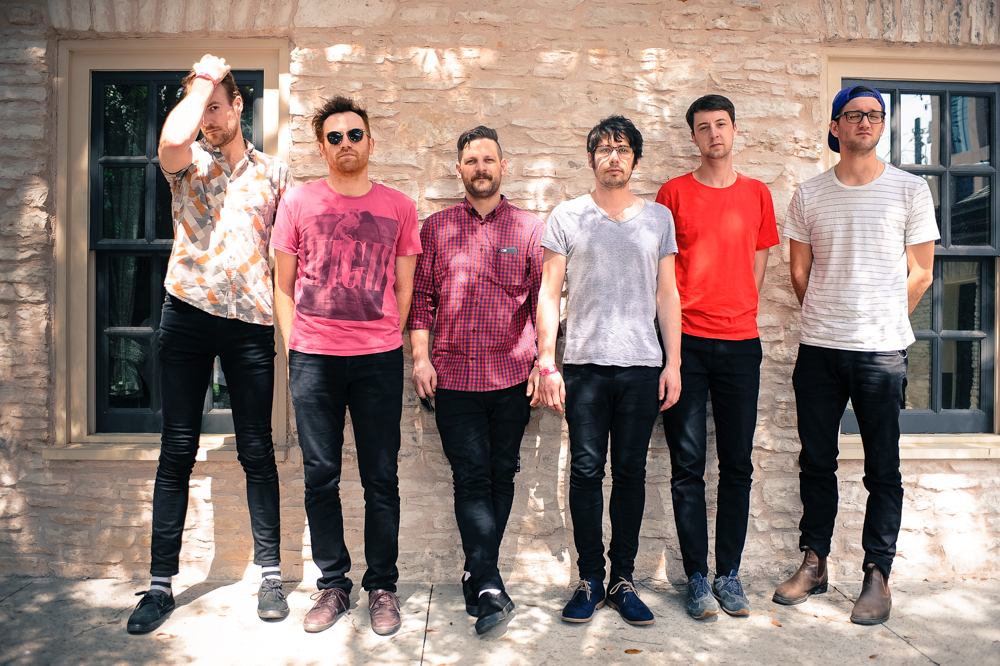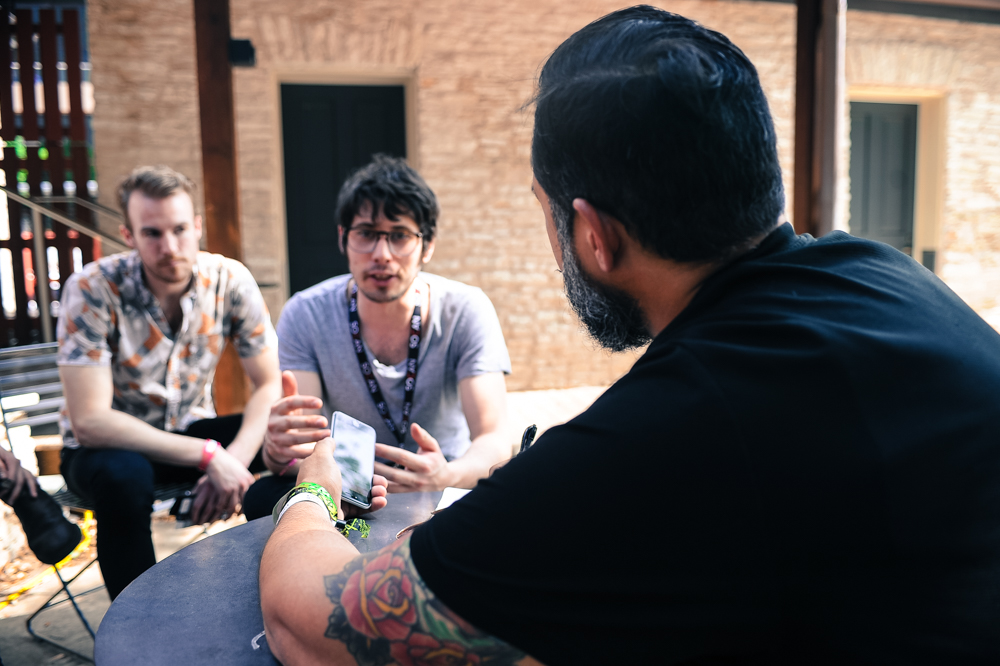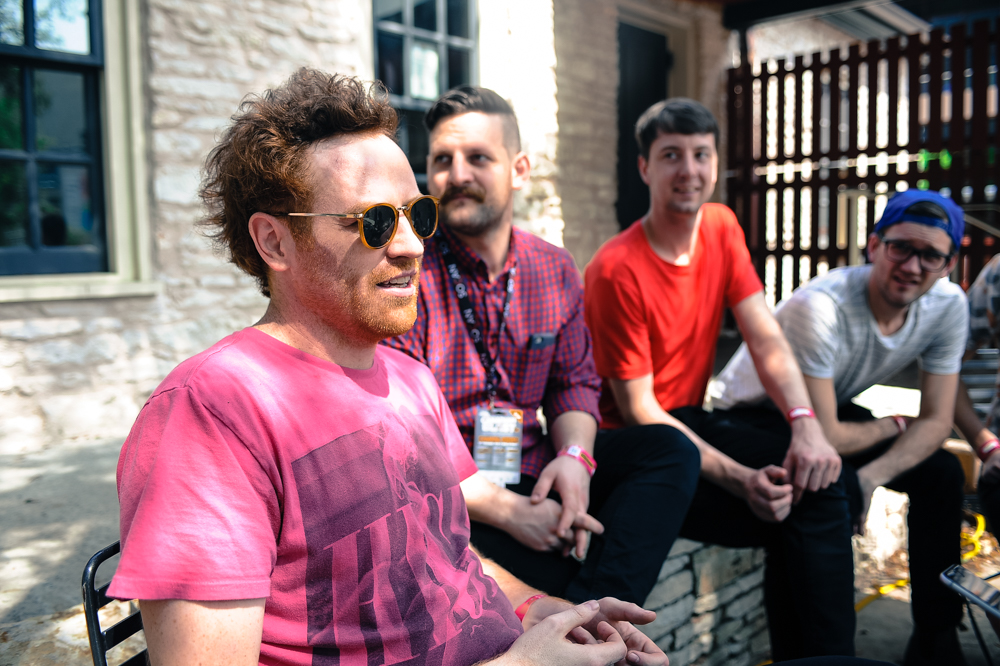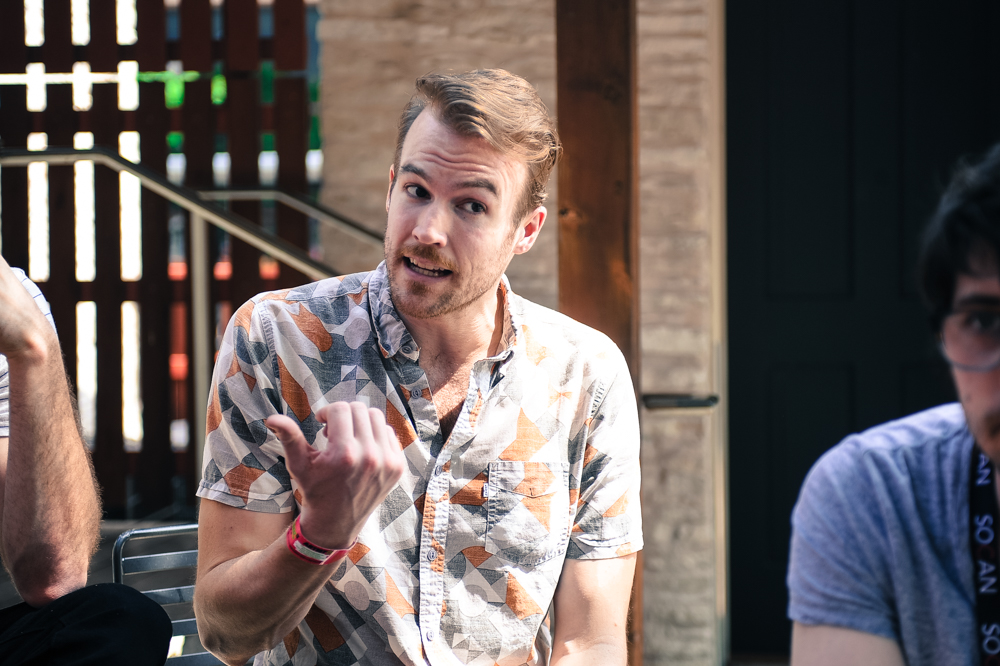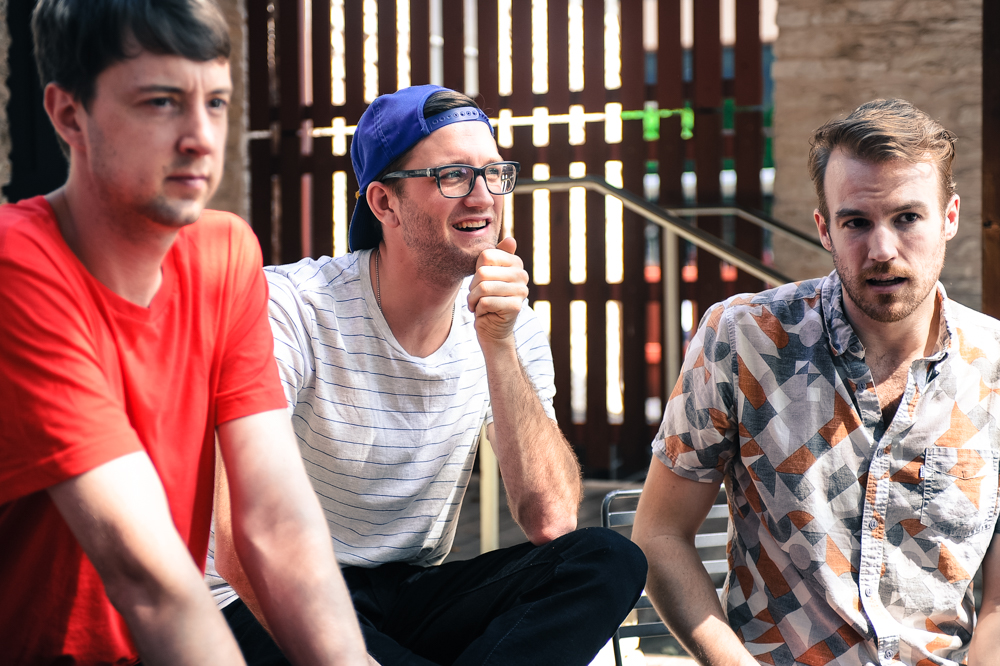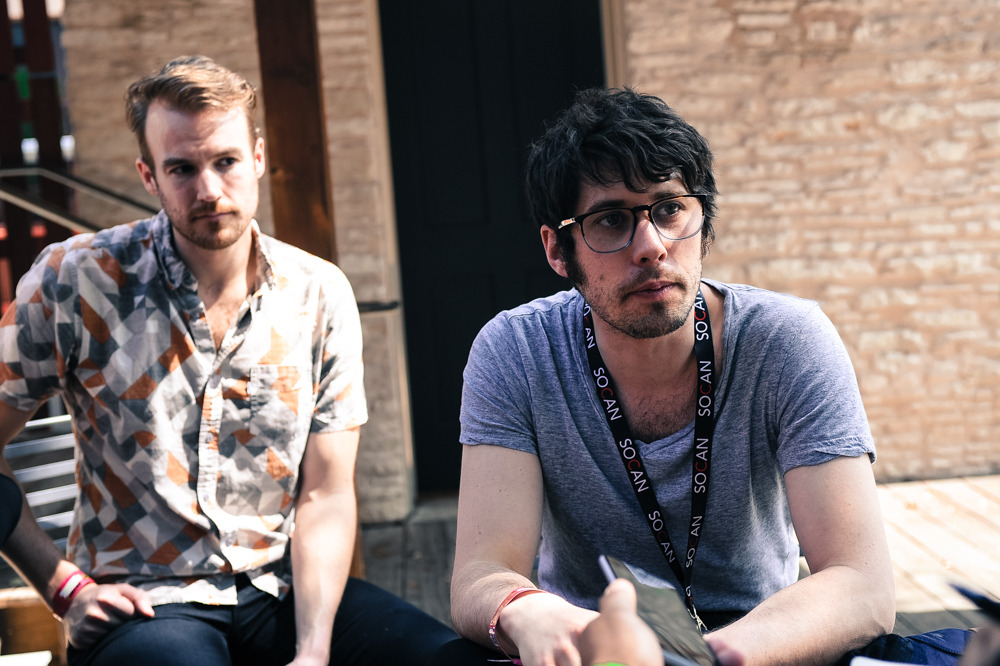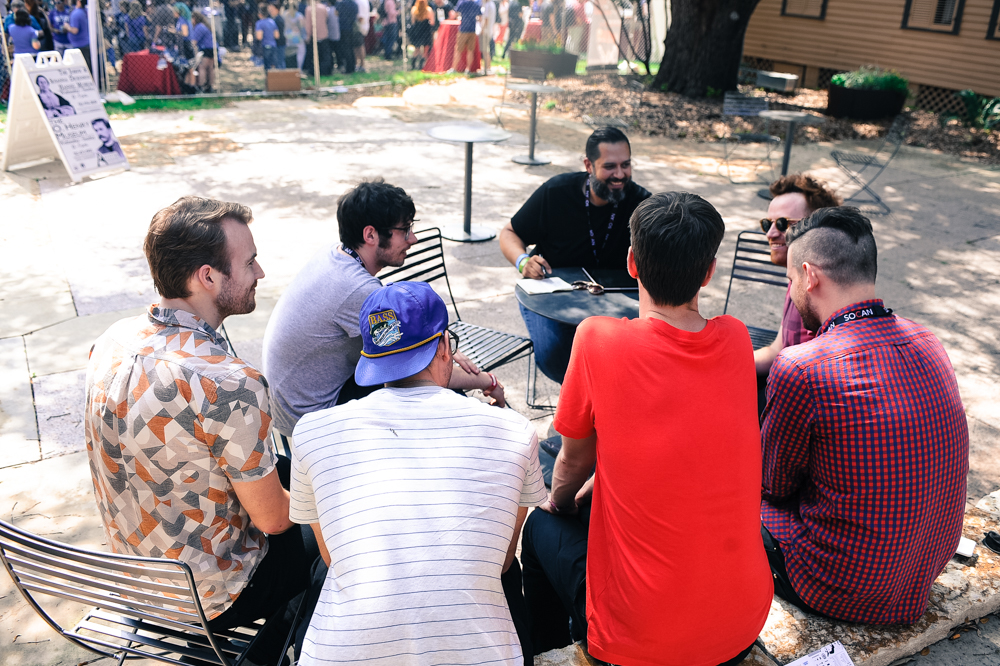On the heels of an upcoming LP and tour, the Winnipeg-based indie pop/rock band Royal Canoe returned to Austin for SXSW 2016. Since their last appearance at SXSW two years ago, their LP Today We’re Believers was nominated for a Juno Award for Alternative Album of the Year, and they have been hard at work with Atlanta-based producer and composer Ben Allen, whose recent credits include projects with Cee-Lo Green, Deerhunter, and Bombay Bicycle Club. Alex Freeman caught up with them before their afternoon performance at the Canadian Blast BBQ and Showcase to talk about their recent adventures, music festivals, and more.
You’ve been in the studio for several months working on the follow-up to the 2013 LP Today We’re Believers. What can we expect to hear today?
Matt Peters: We’re going to play five songs — four of them are gonna be new off the upcoming record, and we are going to be playing an old song as well. Gonna be a lot of new songs.
Last November you had some Visa processing time issues and missed out on touring the Eastern US with Wild Child. How did that affect the band’s momentum, and what did you do with the extra time you weren’t expecting to have?
Matt Peters: We all had a number of other projects that we had on deck, so when we finally had the time we were able to dive in a little bit more. To be honest, we have been so busy since the previous year working on the record that having a little time around the holidays was actually not so bad.
It’s amazing how much something like that, when a tour gets canceled, has a domino effect, because you have meetings and plans — and [because of] the way it was going to coordinate with our record release, we were really depending on that. In a way, it kind of set us back a few months. We are finally back to the momentum place now that we were at then. It’s amazing how one small little change can have such a lasting effect on your timeline.
Anyone else on the extra time?
Michael Jordan: I went to Guatemala.
Brendan Berg: Matt and I just went to New York anyway — it was supposed to be four days in New York.
Matt Peters: Yeah. My girlfriend had a flight booked, and Brendan was also meeting someone there, so we said, “Let’s just go. Why would we not go? This is ridiculous.”
Brendan Berg: Yeah, instead of just stewing at home in Winnipeg when we are supposed to be on tour.
Matt Peters: Because it’s not a good time of year to be home in Winnipeg.
Ben Allen is helping mix and produce your anticipated new release. Can you tell us how you worked through ideas together?
Related Posts
Matt Peters: We had about maybe 20 to 25 initial song ideas that we had worked on few a months, and we sent them to him and ping-ponged back and forth on which songs we were going to go with. And then again, he was really, really helpful in getting us to focus our energy on the right things. He had this phrase challenging us to tell a story of our music. He did a great job of holding us to that.
We all sort of produce and mix; even our sound has a lot of variety in it. So having someone who can come in and who has some measure of objectivity, and who wasn’t involved in writing the songs, can say, “This is what we are going to go with. Let’s focus on this specific flavor for the mix,” or, “Let’s focus on highlighting these instruments.” Because, left to our own devices, if we were given enough time, every song we worked on would end up being white noise because we would just keep layering things. So having someone come along who is less invested in “That’s my part,” or, “That’s the first thing we wrote, we gotta keep that” can cut through the democracy and help us make decisions. He was really helpful.
You now have over 300 shows under your belt from the past few years of touring. How have your live performances changed over time?
Bucky Driedger: I think we finally learned how to play the first record of songs we that we released — and just in time, because now we have a new record that we have to figure out how to play live.
Matt Schellenberg: We record everything multi-track, so it takes a while to learn how to actually play the song live. Half the time you are learning a part that someone else wrote for your instrument. Or, I’m playing a bunch of Bucky’s guitar parts on my keyboard, or he’s playing a bunch of little things I made with keyboard on his guitar. We have this giant spreadsheet — it’s so clinical, but a giant Excel spreadsheet that has every single noise, every single thing. I think we miss three or four per song.
Matt Peters: It seems like a song is done when six people can play it. Oddly enough, we never really write with the intention of live performance in mind. We trust that it will work out in the end. Fingers crossed, we are now through the second record where we can play all the songs and they feel right. It doesn’t feel like we are just up there hitting play on a laptop or it’s some sort of compromise event. I think we are lucky, to be honest.
Derek Allard: Somehow we have managed to acquire more gear than we need to use for these new songs.
Matt Peters: It’s funny too; I remember when Bucky said he wanted to get a new compressor pedal. “The guitar doesn’t sound loud enough in that one song — need a new peddle.” That’s when you know you’re getting old as a musician, when instead of turning the volume up you’d rather just press a pedal.
What is the music scene like in Winnipeg?
Matt Schellenberg: It’s budding. There are a lot of new bands that are just starting to do things. A couple new young bands getting talked about on Pitchfork, getting good teams together that I haven’t seen in a while. A band called Living Hour is doing well, Yes We Mystic is a band that is sort of up and coming. Bucky started a booking agency, so he would know better than me.
Bucky Driedger: The size of the Winnipeg, it’s never going to be as vibrant as New York or Austin even. Given the amount of people there, I’m really surprised on how much good stuff is going on. The one thing that is great about Winnipeg is that there is a lot of cross-pollination between artistic disciplines. Visual artists, filmmakers, dancers, and musicians are intermingling, collaborating, partying, and hanging out. That makes for a lot of interesting extra projects. That’s one way that Winnipeg and Austin scenes are similar: that there is so much collaboration, cross-media for one, but also musicians playing in bands with each other in different formations. Most of us are too busy when Royal Canoe is going to collaborate with anyone else, for the most part. But we have our opportunities here and there.
Funding for the arts in Canada, we’re pretty lucky in that regard. Manitoba specifically, We’re an isolated province; we’re not Toronto, Vancouver, or Montreal. The people that work with Manitoba music really help provide a lot of opportunities and sort of help people connect some of the dots to make things happen and push their careers forward. We’re super lucky.
What’s your take on music festivals after having performed at Bonnaroo, one of the biggest in the US?
Matt Schellenberg: We’ve done a couple, but nothing [else] as large as Bonnaroo. But I felt that Bonnaroo had one of the best community vibes for a festival that size. It felt like people had your back, as opposed to some music festivals that just feel like a million bros on E, to be really frank about it. Bonnaroo didn’t feel like that, although there were probably a million bros on E, there were probably two million bros that weren’t on E that were really nice.
Do you have a preferred venue? I saw you guys at the Central Presbyterian Church in 2014 and I couldn’t think of a better match.
Bucky Driedger: I think that the Central Presbyterian Church is the best SXSW venue we played for sure; it had such a cool vibe and acoustics.
Matt Peters: Playing outdoors is nice though, especially this time of year because any minute we can spend outdoor is a luxury at this stage in the season. It’s nice to be outside.
Who are you most looking forward to seeing this week at SXSW?
Related Posts
Group: Anderson .Paak, CocoRosie, Eryka Badhu, Wye Oake, White Denim, and Neon Indian.
The last time you played a SXSW showcase in Austin, it was in 2014, the night after the fatal car accident that took four people’s lives. Have you observed anything about this year’s SXSW that was different from two years ago?
Matt Peters: Its only like three hours into it on Wednesday, which seems a little too early to judge. It does seem more chill right now than it did [in 2014]. I remember at the end of the SXSW 2014 feeling so overwhelmed and exhausted with so much corporate influence and the overabundance of people. Something like a car accident or anything like that was bound to happen at some point, and I mean it’s tragic, but maybe in a way the people who are running the festival have learned that you have to contain these things at some level. It’s kind of like this living organism in a way. I think there are 2,800 bands comprising of 4,300 artists — that’s so many people that come here, and everyone is like a little minnow bobbing their little mouth out above the water just trying to get a nibble, and it gets really overwhelming. I think it’s impossible not to have a little bit of cynical edge to your experience here, but I kind of made up my going into this year that I’m just going to enjoy myself and not let that kind of get to me.
Matt Schellenberg: I think there is something bizarrely healthy as a band to come here too where there is just absolutely nothing special about you being in a band; everybody is in a band. In your little city, maybe you get noticed in your coffee shop because you’re in a band and Joe whatever isn’t, and here it’s just like absolutely everybody is like you; there are 20 of you that look exactly like you and play to way more people than you, and I think it’s a healthy grounding kind of barometer of where you are at that something everyone should do. It’s nice that they are focusing seemingly more on people at that level instead of making it like a Coachella or Bonnaroo, because that’s not what it’s supposed to be about.
Matt Peters: When Big Boi was here, I don’t know if it was 2013 or 2014, but I remember being so excited that we got here three hours early and the line-up was at 10 pm and the line was like eight times around the block. It just seems like it’s difficult to enjoy that experience. What are you actually exposing yourself to if you are not seeing the music? Maybe the interactive festival is different, but if you are not actually listening to the music, and all you are doing is sort of hopping from one disappointing line to the next and being overwhelmed by this corporate noise, you are kind of missing the point of why you are here. Anything that redirects that energy into a more meaningful experience would be great, so we’ll see.
